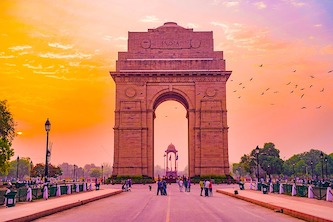The city of Delhi in India has been dealing with really bad air pollution for a few days now. To try and fix this problem, the city’s environment minister has suggested using cloud seeding, which is a way to make it rain artificially. But some experts are worried that this might not work well and could harm the environment in the long run. Even though there are some uncertainties, the leaders in charge really want to find a solution to Delhi’s pollution problem.
The Air Quality Index (AQI) in Delhi, which measures how much tiny particles are in the air, has been way above the safe limit for the past two weeks. Pollution in the city gets worse in the winter because of things like burning crops and slow winds. The government in Delhi has tried to fix the problem by doing things like letting kids out of school early and stopping construction. Now they’re asking the Supreme Court for permission to use cloud seeding.
Cloud seeding is when you spray tiny particles of salt onto clouds to make it rain. But for this to work, the weather conditions have to be just right, like having enough moisture and wind. The salt particles have to be sprayed into clouds that are growing upwards. Cloud seeding has been used in different countries to make it rain more or to fight droughts, but we’re not sure if it can really help with pollution.
Some experts think that while rain can help clean the air for a little bit, cloud seeding might only give temporary relief. They believe that it’s not a good idea to use resources on something that might not work well and only help for a short time. They say that we need to have a plan that everyone agrees on to fix the pollution problem, and that we need to listen to experts from different fields.
Other experts are worried that there isn’t enough proof that cloud seeding will work, and that it might have some downsides. They think that we need to work together and come up with a big plan to fix the pollution problem, instead of trying little things here and there. It’s important to think about what could happen in the long run and if there are any risks to changing how nature works.
In the end, the idea of using cloud seeding to fight air pollution in Delhi has made some people hopeful, but others are not so sure. While it might help for a little bit, experts think that we need a bigger and more sustainable plan to fix the pollution problem in the city.
Original news source: Delhi AQI: Can artificial rain fix toxic air in India’s capital? (BBC)
Listen
Slow
Normal
Fast
Group or Classroom Activities
Warm-up Activities:
– Opinion Poll
Instructions: Split the class into small groups and give each group a statement about cloud seeding, such as “Cloud seeding is an effective long-term solution for pollution.” Have students discuss within their groups whether they agree or disagree with the statement and why. After the discussion, conduct a class-wide poll to see where students stand on the issue.
– Speed Summarizing
Instructions: Pair up students and challenge them to summarize the article to their partner in just one minute. Afterward, have the partners switch roles. This will encourage students to focus on the key points and practice concise language use.
– Pros and Cons
Instructions: Ask students to list the pros and cons of using cloud seeding as a solution for pollution in Delhi. They can do this individually or in pairs. Then, bring the class together and have a discussion based on the lists they created, encouraging the use of specific vocabulary from the article.
– Future Predictions
Instructions: Invite students to write a short paragraph predicting the future of Delhi’s air pollution situation. They should include whether they think cloud seeding will be used and what the potential outcomes might be. Encourage them to use modal verbs for speculation (e.g., might, could, should).
– Think-Pair-Share
Instructions: Pose a question to the class, such as “What alternative solutions could Delhi consider to address its air pollution problem?” Have students first think about their answer individually, then pair up to discuss their ideas, and finally share their thoughts with the larger group. This activity encourages critical thinking and speaking practice.
Comprehension Questions:
1. What has the city of Delhi been experiencing for the past few days?
2. What solution has the city’s environment minister suggested to combat the air pollution?
3. Why are some experts concerned about the proposed solution of cloud seeding?
4. According to the article, what causes pollution in Delhi to worsen during the winter?
5. What actions has the Delhi government taken to address the pollution issue before considering cloud seeding?
6. How does cloud seeding work, and what conditions are necessary for it to be successful?
7. What are some of the arguments experts have made against relying on cloud seeding as a solution to pollution?
8. What do experts believe is necessary to effectively tackle the pollution problem in Delhi in the long term?
Go to answers ⇩
Listen and Fill in the Gaps:
The city of Delhi in India has been (1)______ with really bad air pollution for a few days now. To try and fix this (2)______, the city’s environment minister has suggested using cloud seeding, which is a way to make it rain artificially. But some experts are worried that this might not work well and could harm the environment in the long run. Even though there are some uncertainties, the leaders in charge really want to find a solution to Delhi’s pollution problem.
The Air Quality Index (AQI) in Delhi, which (3)______ how much tiny particles are in the air, has been way above the safe (4)______ for the past two weeks. Pollution in the city gets worse in the (5)______ because of things like burning crops and slow winds. The government in Delhi has tried to fix the problem by doing things like letting kids out of school early and (6)______ construction. Now they’re asking the (7)______ Court for permission to use cloud seeding.
(8)______ seeding is when you spray tiny particles of salt onto clouds to make it rain. But for this to work, the weather conditions have to be just right, like having enough moisture and wind. The salt particles have to be sprayed into clouds that are growing upwards. Cloud seeding has been used in different countries to make it rain more or to fight droughts, but we’re not sure if it can really help with pollution.
Some experts think that while rain can help (9)______ the air for a little bit, cloud seeding might only give temporary relief. They believe that it’s not a good idea to use resources on something that might not work well and only help for a (10)______ time. They say that we need to have a plan that everyone agrees on to fix the pollution problem, and that we need to listen to experts from different (11)______.
Other experts are worried that there isn’t enough (12)______ that cloud seeding will work, and that it might have some downsides. They (13)______ that we need to work together and come up with a big plan to fix the pollution problem, instead of trying (14)______ things here and there. It’s important to think about what could happen in the long run and if there are any risks to changing how nature works.
In the end, the idea of (15)______ cloud seeding to fight air pollution in Delhi has made some people hopeful, but others are not so sure. While it might help for a little bit, experts think that we need a bigger and more (16)______ plan to fix the pollution problem in the city.
Go to answers ⇩
Discussion Questions:
Students can ask a partner these questions, or discuss them as a group.
1. What is air pollution, and have you ever experienced it where you live?
2. How would you feel if your city had air so polluted that you needed to wear a mask?
3. Do you think it’s a good idea to use technology to change the weather? Why or why not?
4. What are some ways you can think of to reduce air pollution in big cities?
5. Have you heard of cloud seeding before? What do you think about it?
6. Why do you think pollution gets worse in the winter in some cities?
7. What would you do if your school closed early because of pollution?
8. Do you think it’s fair to stop construction work to improve air quality? Why or why not?
9. Can you think of any possible problems with making it rain artificially?
10. How important is it to have a long-term plan to solve environmental issues?
11. Do you believe that all experts should agree on a solution before trying to solve a problem like air pollution?
12. What are some risks you can imagine if we change how nature works?
13. Do you think that temporary solutions to pollution are useful or a waste of resources?
14. How can we make sure that the solutions for pollution are sustainable for a long time?
15. Would you be hopeful or skeptical if your government suggested using cloud seeding to fight pollution? Why?
Individual Activities
Vocabulary Meanings:
Match each word to its meaning.
Words:
1. air pollution
2. cloud seeding
3. environment
4. particles
5. relief
6. resources
7. downsides
8. sustainable
Meanings:
(a) Tiny pieces of something
(b) Able to continue for a long time without causing harm
(c) The natural world around us, including plants and animals
(d) Negative aspects or disadvantages
(e) Dirty air that is harmful to breathe
(f) Things like money, time, and materials that we use
(g) Temporary improvement or lessening of a problem
(h) Spraying tiny particles onto clouds to make it rain
Go to answers ⇩
Multiple Choice Questions:
1. What is the main problem that Delhi is currently facing?
(a) Water pollution
(b) Air pollution
(c) Traffic congestion
(d) Noise pollution
2. What is cloud seeding?
(a) Spraying chemicals onto clouds to make them disappear
(b) Spraying water onto clouds to make them bigger
(c) Spraying paint onto clouds to make them colorful
(d) Spraying tiny particles of salt onto clouds to make it rain
3. Why does pollution in Delhi get worse in the winter?
(a) Burning crops and slow winds
(b) Heavy rainfall and strong winds
(c) Increased construction and traffic
(d) Industrial emissions and pollution from neighboring cities
4. What is the Air Quality Index (AQI) used for?
(a) To measure the temperature in the city
(b) To measure the humidity in the air
(c) To measure the amount of tiny particles in the air
(d) To measure the noise levels in the city
5. What are some concerns about using cloud seeding to fight pollution?
(a) It could harm the environment in the long run
(b) There isn’t enough proof that it will be effective
(c) All of the above
(d) It might not work well and only provide temporary relief
6. What do experts suggest as a solution to Delhi’s pollution problem?
(a) Listening to experts from different fields
(b) Working together to come up with a big plan
(c) Having a plan that everyone agrees on
(d) All of the above
7. How do some experts feel about the idea of using cloud seeding in Delhi?
(a) They are hopeful that it could help
(b) They think it’s not a good idea and won’t work well
(c) They believe it could have downsides
(d) All of the above
8. What is the overall conclusion about using cloud seeding to fight pollution in Delhi?
(a) It is the best solution to fix the pollution problem
(b) It might help temporarily, but a bigger and more sustainable plan is needed
(c) It will have long-lasting benefits and no downsides
(d) It is not worth trying and will not make a difference
Go to answers ⇩
True or False Questions:
1. The city’s environment minister has proposed using cloud seeding to combat the pollution issue.
2. Cloud seeding involves spraying tiny salt particles onto clouds to enhance rainfall.
3. The government has implemented measures such as early school closures and construction halts to combat pollution.
4. Pollution in Delhi improves during the winter due to factors like crop burning and slow winds.
5. The city of Delhi in India has been experiencing severe air pollution for several days.
6. The Air Quality Index (AQI) in Delhi has been consistently below the safe limit for the past two weeks.
7. Some experts are concerned that cloud seeding might not be effective and could harm the environment in the long term.
8. While some experts believe rain can temporarily improve air quality, they argue for a comprehensive and long-term solution to the pollution problem.
Go to answers ⇩
Write a Summary:
Write a summary of this news article in two sentences.
Check your writing now with the best free AI for English writing!
Writing Questions:
Answer the following questions. Write as much as you can for each answer.
Check your answers with our free English writing assistant!
1. What solution has Delhi’s environment minister proposed to address the air pollution issue?
2. Why are some experts concerned about the use of cloud seeding in Delhi?
3. What are some of the conditions necessary for cloud seeding to be successful?
4. What actions has the Delhi government already taken to try to reduce the pollution levels?
5. Why do some experts believe that a larger, more sustainable plan is needed to tackle Delhi’s air pollution problem?
Answers
Comprehension Question Answers:
1. What has the city of Delhi been experiencing for the past few days?
The city of Delhi has been dealing with really bad air pollution.
2. What solution has the city’s environment minister suggested to combat the air pollution?
The city’s environment minister has suggested using cloud seeding to make it rain artificially.
3. Why are some experts concerned about the proposed solution of cloud seeding?
Some experts are concerned that cloud seeding might not work well, could only provide temporary relief, and could potentially harm the environment in the long run.
4. According to the article, what causes pollution in Delhi to worsen during the winter?
Pollution in Delhi gets worse in the winter because of things like burning crops and slow-moving winds.
5. What actions has the Delhi government taken to address the pollution issue before considering cloud seeding?
The Delhi government has tried to fix the problem by letting kids out of school early and stopping construction work.
6. How does cloud seeding work, and what conditions are necessary for it to be successful?
Cloud seeding works by spraying tiny particles of salt onto clouds to make it rain. The right conditions for it to be successful include having enough moisture in the atmosphere and the right kind of wind. The salt particles need to be sprayed into clouds that are growing upwards.
7. What are some of the arguments experts have made against relying on cloud seeding as a solution to pollution?
Experts argue that cloud seeding might only give temporary relief, might not work effectively, and it’s not a good use of resources. They stress the need for a long-term, agreed-upon plan to address the pollution problem.
8. What do experts believe is necessary to effectively tackle the pollution problem in Delhi in the long term?
Experts believe that a larger, more sustainable plan is necessary to effectively tackle the pollution problem in Delhi in the long term. They emphasize the importance of a comprehensive strategy that takes into account the potential long-term effects and risks.
Go back to questions ⇧
Listen and Fill in the Gaps Answers:
(1) dealing
(2) problem
(3) measures
(4) limit
(5) winter
(6) stopping
(7) Supreme
(8) Cloud
(9) clean
(10) short
(11) fields
(12) proof
(13) think
(14) little
(15) using
(16) sustainable
Go back to questions ⇧
Vocabulary Meanings Answers:
1. air pollution
Answer: (e) Dirty air that is harmful to breathe
2. cloud seeding
Answer: (h) Spraying tiny particles onto clouds to make it rain
3. environment
Answer: (c) The natural world around us, including plants and animals
4. particles
Answer: (a) Tiny pieces of something
5. relief
Answer: (g) Temporary improvement or lessening of a problem
6. resources
Answer: (f) Things like money, time, and materials that we use
7. downsides
Answer: (d) Negative aspects or disadvantages
8. sustainable
Answer: (b) Able to continue for a long time without causing harm
Go back to questions ⇧
Multiple Choice Answers:
1. What is the main problem that Delhi is currently facing?
Answer: (b) Air pollution
2. What is cloud seeding?
Answer: (d) Spraying tiny particles of salt onto clouds to make it rain
3. Why does pollution in Delhi get worse in the winter?
Answer: (a) Burning crops and slow winds
4. What is the Air Quality Index (AQI) used for?
Answer: (c) To measure the amount of tiny particles in the air
5. What are some concerns about using cloud seeding to fight pollution?
Answer: (d) It might not work well and only provide temporary relief
6. What do experts suggest as a solution to Delhi’s pollution problem?
Answer: (c) Having a plan that everyone agrees on
7. How do some experts feel about the idea of using cloud seeding in Delhi?
Answer: (a) They are hopeful that it could help
8. What is the overall conclusion about using cloud seeding to fight pollution in Delhi?
Answer: (b) It might help temporarily, but a bigger and more sustainable plan is needed
Go back to questions ⇧
True or False Answers:
1. The city’s environment minister has proposed using cloud seeding to combat the pollution issue. (Answer: False)
2. Cloud seeding involves spraying tiny salt particles onto clouds to enhance rainfall. (Answer: False)
3. The government has implemented measures such as early school closures and construction halts to combat pollution. (Answer: True)
4. Pollution in Delhi improves during the winter due to factors like crop burning and slow winds. (Answer: False)
5. The city of Delhi in India has been experiencing severe air pollution for several days. (Answer: True)
6. The Air Quality Index (AQI) in Delhi has been consistently below the safe limit for the past two weeks. (Answer: False)
7. Some experts are concerned that cloud seeding might not be effective and could harm the environment in the long term. (Answer: True)
8. While some experts believe rain can temporarily improve air quality, they argue for a comprehensive and long-term solution to the pollution problem. (Answer: True)
Go back to questions ⇧















